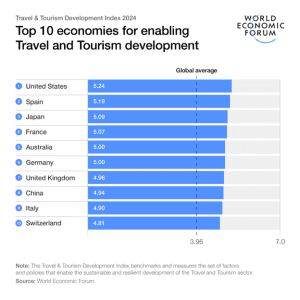TAG: GS 3: ECONOMY
THE CONTEXT: India has experienced a significant decline in the World Economic Forum’s Travel and Tourism Development Index (TTDI) rankings, falling ten places since 2019 to rank 39th in 2024.
EXPLANATION:
- Despite the robust growth of its travel sector and a strong economic rebound post-COVID-19, several underlying issues have contributed to this decline.
Key Factors Affecting India’s Ranking
- Weak Access to Healthcare Facilities
- One of the critical factors negatively impacting India’s ranking is the inadequate access to healthcare facilities.
- This shortfall affects the overall attractiveness and safety perception of India as a travel destination.
- Inadequate Tourism Infrastructure
- India’s tourism infrastructure, including airports, hotels, and local transport, has been deemed insufficient to support the growing number of tourists.
- This lack of infrastructure development hinders the seamless experience that international travelers expect.
- Low-Skilled Manpower
- The tourism sector in India suffers from a shortage of skilled labor.
- Poorly skilled human resources in the hospitality and tourism industry diminish the quality of services provided to tourists, affecting overall satisfaction and repeat visits.
Comparative Analysis
- Performance of Other Major Economies
- Among the world’s top 10 economies, India experienced the sharpest decline, followed by the UK, which dropped three places to seventh.
- The US maintained its top position, while China, the world’s second-largest economy, improved its ranking to eighth.
- Emerging Market Peers
- India’s overall TTDI score of 4.25 out of 7 is lower than that of its emerging market peers, such as China and Brazil.
- This score indicates that despite having competitive cultural and natural resources, India lags behind in several key areas crucial for sustainable tourism development.
Areas of Strength
- Price Competitiveness
- India scores high on price competitiveness, making it an affordable destination for travelers.
- This is a significant advantage in attracting budget-conscious tourists.
- Cultural and Natural Resources
- India boasts a rich cultural heritage and diverse natural landscapes, which enhance its appeal as a tourist destination.
- These resources remain a strong point for the country’s tourism sector.
Areas for Improvement
- Tourism Policies and Regulations
- The report highlights the need for India to streamline its tourism policies and regulations.
- Creating a more conducive environment for both domestic and international travelers through regulatory reforms could significantly boost India’s attractiveness as a travel destination.
- Investment in Infrastructure
- Incentivizing investment in tourism infrastructure is crucial.
- Improving air transport facilities, enhancing tourist services, and developing more robust infrastructure are necessary steps to accommodate and attract more tourists.
- Overseas Promotion and Marketing
- A notable reduction in government funding for overseas tourism promotions has dampened India’s efforts to attract high-spending inbound tourists.
- The allocation for overseas tourism promotion has significantly decreased from ₹524 crores in 2021-22 to ₹167 crore in FY24.
- There is a need for increased investment in marketing India as a premier travel destination.
- Skills Development
- Addressing the shortage of skilled manpower through targeted training programs and initiatives can improve service quality in the tourism sector.
- This enhancement is essential for ensuring a positive experience for visitors.
Regional Performance and Recovery
- Asia-Pacific Region
- The Asia-Pacific region was the second-highest performer globally, but it experienced the largest average decline in TTDI scores (-0.7%) due to delays in easing travel restrictions and recovering air route capacity.
- Japan, Australia, and China lead in travel and tourism development within the region, while India ranks as the top lower-middle-income economy.
- Global Recovery Trends
- The global travel and tourism industry, historically accounting for 10% of global GDP, is on a recovery path post-pandemic.
- International tourist arrivals are projected to reach 88% of 2019 levels in 2023 and are likely to return to pre-pandemic levels by 2024.
- West Asia has seen tourist arrivals 20% above 2019 levels, with Europe, Africa, and the Americas recovering to around 90% of their pre-pandemic levels.
Challenges and Recommendations
- Environmental and Geopolitical Issues
- The travel and tourism sector faces significant challenges, including environmental issues such as biodiversity loss, climate-related extreme weather events, and pollution.
- Geopolitical issues and natural disasters also pose risks to tourism resources and infrastructure.
- Sustainable Practices
- The sector, which accounted for 5.8% of global water use and 5-8% of global material extraction in 2019, is under pressure to adopt more sustainable practices.
- Embracing sustainable and inclusive development is crucial for harnessing the sector’s potential to contribute to global well-being and address worldwide challenges.
- Policy Changes and Incentives
- Small policy changes, such as incentivizing transiting travelers with a 48-hour free transit visa facility, can significantly impact India’s tourism landscape.
- Additionally, schemes like the Services Exports from India Scheme (SEIS) can help small and medium companies in the travel space expand their businesses.
Travel and Tourism Development Index 2024:
- The Travel & Tourism Development Index (TTDI) 2024 is the second edition of an index that evolved from the Travel & Tourism Competitiveness Index (TTCI) series.
- It is a flagship index of the World Economic Forum that has been in production since 2007.
- The TTDI is part of the Forum’s broader work with industry and government stakeholders to build a more sustainable, inclusive, and resilient future for economies and local communities.
- The 2024 edition of the TTDI includes several improvements based on newly available data and recently developed indicators on the environmental and social impact of travel and tourism.
- The changes made to the 2024 Index limit its comparability to the previously published TTDI 2021.
- This year’s report includes recalculated 2019 and 2021 results, using new adjustments. TTDI 2024 reflects the latest available data at the time of collection – end of 2023.
- The TTDI is part of the Forum’s broader work with industry communities actively working to build a better future enabled by sustainable, inclusive, and resilient industry ecosystems.





